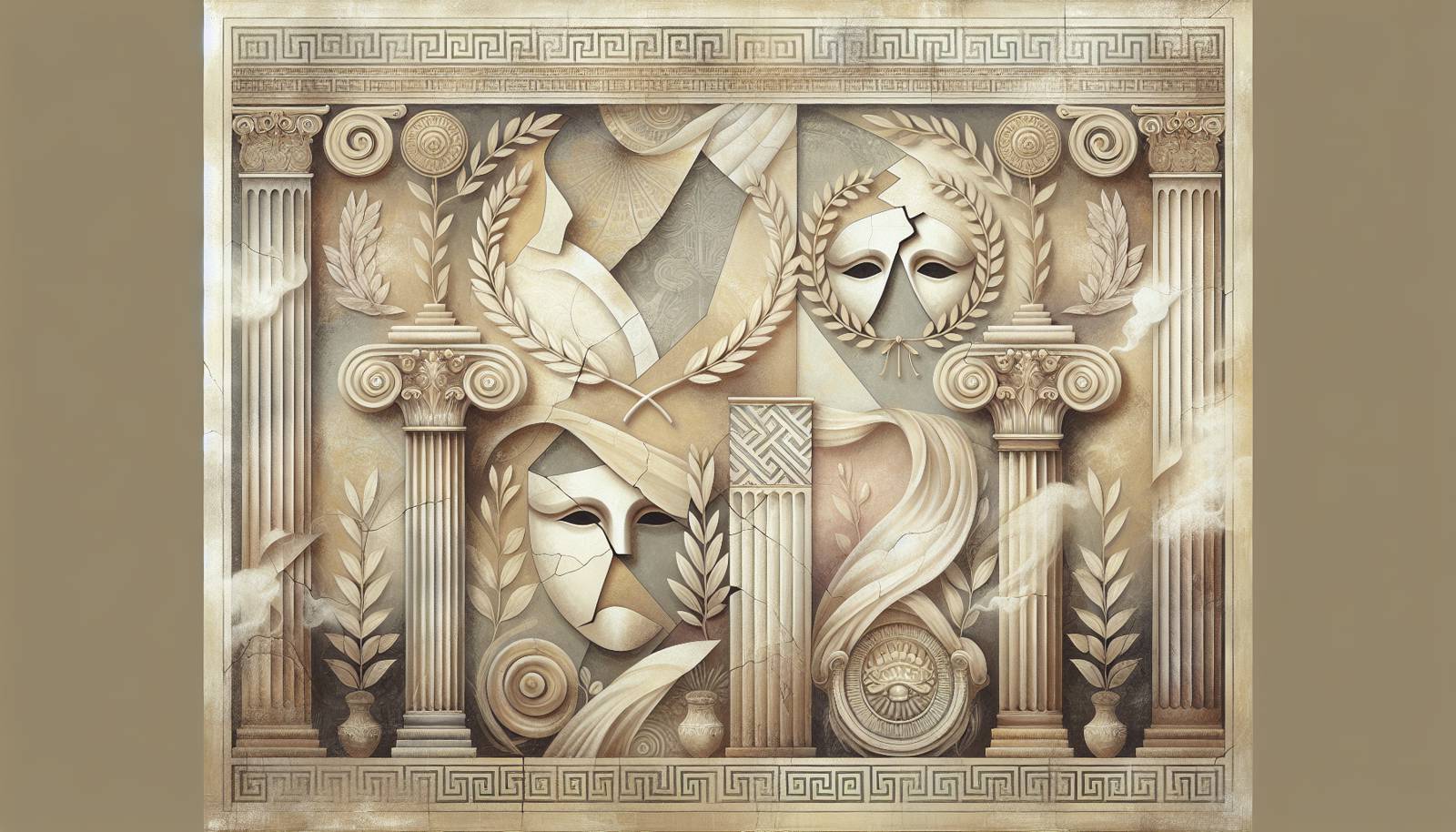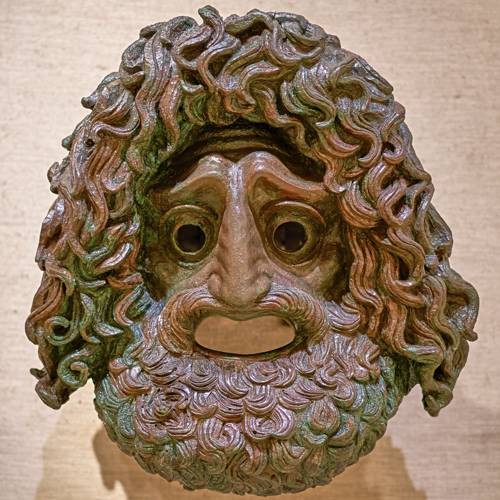
FAQ About The Influence of Greek Tragedy on Modern Drama

What are the defining characteristics of Greek tragedy?
Greek tragedy is a form of theater from ancient Greece that presents a serious subject matter centering on human suffering and corresponding intense emotions. The key characteristics include a noble protagonist with a tragic flaw (hamartia), a plot that involves conflict and leads to a catastrophic ending, and themes involving fate, the gods, and moral dilemmas. Greek tragedies often employ a chorus that offers commentary and reflections on the events.

How has Greek tragedy influenced narrative structure in modern drama?
Greek tragedy has heavily influenced the three-act structure commonly used in modern drama. The exposition introduces characters and conflict, the rising action develops the plot and complicates relationships, and the climax leads to a resolution or a tragic ending. This structured approach helps create tension and emotional engagement, which are hallmarks of both Greek and contemporary narratives.

In what ways has character development in Greek tragedy impacted modern drama?
Character development in Greek tragedy is centered around complex characters with inner conflicts and moral dilemmas, which has influenced modern playwrights to create multi-dimensional characters with psychological depth. Characters like Oedipus and Antigone showcase personal evolution and ethical struggles, inspiring contemporary dramas to explore similar themes of identity, choice, and consequence.

Can you give an example of a modern play influenced by Greek tragedy?
"A Streetcar Named Desire" by Tennessee Williams is a modern play influenced by Greek tragedy. The protagonist, Blanche DuBois, showcases a tragic arc and a downfall caused by personal flaws and societal pressures. The play's themes of fate, inevitable downfall, and complex character dynamics echo the essence of Greek tragedies.

What themes common in Greek tragedy are present in modern dramas?
Themes such as fate vs. free will, the nature of justice, and the role of the gods (or higher powers) are prevalent in both Greek tragedy and modern drama. Issues of political power, family dynamics, and existential questions about life and death continue to be explored, maintaining the thematic depth initiated by Greek tragedians.

Why is the concept of the tragic hero significant in both Greek and modern dramas?
The tragic hero is a cornerstone in both Greek and modern drama because it exemplifies the human condition. Characters like Oedipus embody virtues and flaws that lead to their downfall, reflecting universal truths about human nature. This relevance persists today, allowing audiences to connect emotionally with the tragic hero's journey and the moral or philosophical lessons derived from it.

How does the role of the chorus in Greek tragedy influence modern plays?
The chorus in Greek tragedy functions as the moral and thematic voice of the play, often providing context and reflections on the action. In modern drama, similar devices are used, such as a narrator or collective character group, to offer commentary or guide the audience’s interpretation of the narrative. This helps bridge the audience's understanding and emotional engagement with the story.

What impact did Greek tragedy have on the portrayal of women in modern drama?
Greek tragedies often featured powerful female characters like Antigone and Clytemnestra, who challenged societal norms and exhibited strength and agency. This has influenced modern drama to explore and portray complex female leads who drive the narrative and engage with themes of power, gender, and resistance, reflecting ongoing societal struggles and evolutions in gender dynamics.

How do modern playwrights incorporate the tragic flaw found in Greek tragedy?
Modern playwrights incorporate the tragic flaw, or hamartia, to create tension and depth in their characters' arcs. This flaw leads to the character’s downfall and is essential in exploring themes of pride, ambition, and destiny. Plays such as Arthur Miller's "Death of a Salesman" demonstrate how a protagonist's flaws can result in dramatic conflict and tragedy, echoing the traditions of Greek tragedy.

What are some misconceptions about the influence of Greek tragedy on modern drama?
One common misconception is that Greek tragedies are solely about fatalism and inevitability, overshadowing their relevance in exploring human agency and choice. Additionally, some believe Greek tragedies are archaic and not relatable today, while in reality, their foundational elements of storytelling, character development, and thematic exploration continue to resonate and inform modern drama.

In what ways do modern dramas reflect the themes of hubris and nemesis found in Greek tragedies?
Modern dramas often reflect themes of hubris (excessive pride) and nemesis (retributive justice) by showcasing protagonists who experience downfall due to their arrogance or defiance of moral laws. Examples include plays and films where characters undergo intense personal journeys that ultimately lead to their downfall, mirroring the moral lessons imparted by Greek tragedies.

How has Greek tragedy influenced the portrayal of conflict in modern drama?
Greek tragedies often depict internal and external conflicts driven by personal flaws, fate, or societal pressures. This has influenced modern drama to similarly explore complex conflicts, where characters face moral or ethical dilemmas, personal turmoils, or societal challenges. Understanding the roots of these conflicts allows contemporary narratives to engage deeply with audiences.

What elements of stagecraft in Greek tragedy have been adapted to modern theater?
Greek tragedies used minimal yet symbolic stage designs, masks, and choruses to focus on storytelling and the emotional journey of characters. Modern theater, while technologically advanced, often echoes these elements through minimalist sets, evocative lighting, or ensemble groups that create a focused narrative environment, maintaining the immersive and emotional drive characteristic of ancient performances.

Why do some suggest that Greek tragedy can enhance the educational value of modern drama?
Greek tragedy serves as an educational tool by providing insights into ancient cultural values and universal human themes, thus enhancing the educational value of modern drama. It allows students and audiences to examine profound moral and philosophical questions, understand historical contexts, and appreciate the continuity of storytelling across centuries, fostering critical thinking and empathy.

How has the theme of fate in Greek tragedy impacted modern existential narratives?
The theme of fate in Greek tragedy has profoundly impacted modern existential narratives by reinforcing questions about destiny, personal agency, and the meaning of life. Many contemporary plays and films explore these existential dilemmas, pondering whether individuals are governed by fate or have the autonomy to shape their destinies, reflecting the timeless debate inherent in Greek tragedies.

What lessons can modern playwrights learn from the use of catharsis in Greek tragedies?
Catharsis, the emotional release experienced by the audience at the climax of a tragedy, is a powerful tool for modern playwrights. It emphasizes the emotional and moral impact of the narrative, encouraging audiences to reflect on personal experiences and social issues. By invoking catharsis, modern dramas can achieve profound emotional engagement and provoke thoughtful dialogue about pertinent themes.

How do contemporary plays adapt the themes of justice found in Greek tragedies?
Contemporary plays often adapt themes of justice from Greek tragedies by examining societal and individual notions of right and wrong. They explore the complexities of moral judgment and the consequences of injustice, similar to the way Greek tragedies addressed divine justice versus human laws. This examination continues to challenge audiences to consider their own beliefs and role in societal justice.

What role does destiny play in both Greek tragedies and modern stories?
In both Greek tragedies and modern stories, destiny often serves as a central theme that underscores the conflict between human effort and predetermined outcomes. Characters struggle against or embrace their perceived destinies, leading to narratives that question the balance of fate and free will. This thematic tension adds layers to storytelling, prompting audiences to reflect on the power of destiny in shaping lives.

How are the moral dilemmas in Greek tragedies relevant to today's audiences?
The moral dilemmas in Greek tragedies remain relevant to today's audiences because they address timeless ethical conflicts and human emotions. Issues such as justice, power, loyalty, and the consequences of choices resonate across cultures and eras, inviting contemporary viewers to engage with these age-old questions and reflect on their own lives and societies.
